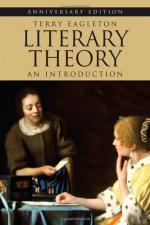
|
| Name: _________________________ | Period: ___________________ |
This test consists of 5 multiple choice questions, 5 short answer questions, and 10 short essay questions.
Multiple Choice Questions
1. For Eagleton, what are the two ways in which literary theory can have a distinct purpose and identity?
(a) It can define itself in terms of methods of inquiry or the object being enquired into.
(b) It can define itself in terms of eradicating inquiry or the object being enquire into.
(c) It can define itself in terms of methods of inquiry and the manner of enquiry.
(d) It can define itself in terms of other methods of inquiry and the manner of enquiry.
2. According to Sigmund Freud, what is the name of the complex whereby a child experiences an unconscious desire for sexual union with its same sex parent?
(a) The Eros complex.
(b) The Pandora complex.
(c) The Oedipus complex.
(d) The Medusa complex.
3. What is the difference between metaphor and metonymy?
(a) In metaphor one sign is privileged over another; in metonymy one sign is associated with another.
(b) In metaphor one sign is substituted for another; in metonymy one sign is privileged over another.
(c) In metaphor one sign is equal to another; in metonymy one sign is less than another.
(d) In metaphor one sign is subtituted for another; in metonymy one sign is associated with another.
4. According to Eagleton, structuralism is a ________of inquiry whereas semiotics is a ______ of study.
(a) Field; type.
(b) Method; field.
(c) Type; manner.
(d) Manner; field.
5. What year did France's student movement strike against the authoritarianism of the educational institutions and in solidarity with the working-class?
(a) 1988.
(b) 1978.
(c) 1968.
(d) 1958.
Short Answer Questions
1. According to Eagleton, the Western philosophical tradition has "consistently vilified" what?
2. For Roland Barthes, what kind of literature attempts to conceal the constructed nature of language?
3. For Jacques Lacan, "meaning is always in some sense an _______."
4. Eagleton writes that his book is less an introduction to literary theory than a what?
5. In American deconstruction, why does literary criticism become an "ironic, uneasy business"?
Short Essay Questions
1. During the 1960s and 1970s why did feminist scholars reject Marxist thought on the left?
2. How did Northrop Frye attempt to combine the formalist focus on the text with the essence of new American criticism?
3. How did Mikhail Bakhtin view language?
4. What was the significance of the Prague structuralists?
5. Who developed semiotics and what was his contribution to literary theory?
6. How did post-structuralism develop and why is it significant?
7. Why does Eagleton argue that politics should engage with questions of sexual ideology?
8. What is significant about the ways in which Sigmund Freud treated women and men?
9. Beyond helping the status of women, what is the women's movement's goal and why is it significant?
10. What does Julia Kristeva define as "semiotic" and why is it significant?
|
This section contains 763 words (approx. 3 pages at 300 words per page) |

|




